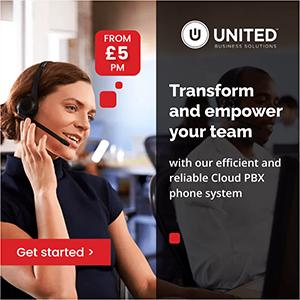Blog
How to lease or rent business phone systems in the UK
In the fast-paced business environment of the UK, clear and efficient communication is key. Not only does this enable smooth internal operations, but it also ensures seamless interactions with clients and partners.
Yet, with evolving technological solutions, investing upfront in phone systems can strain the finances of many businesses. This is where opting for a rental or lease agreement becomes very attractive—offering the benefits of top-tier communication without the hefty initial price tag.
If you’re considering what you need to know to rent the right business phone system, you’re in the right place. This post will provide you with a detailed guide on the key factors to consider to help you make an informed decision.
Key Takeaways
- Leasing a phone system offers premium communication capabilities without the high upfront costs.
- The choice between leasing, renting, and buying depends on commitment levels and future goals.
- Future-proofing communication systems is essential, especially with the impending PSTN switch-off in the UK.
- Thorough research on providers, systems, and lease terms can save businesses high upfront costs and help them find a reliable system.
- Modern phone systems should integrate seamlessly with existing infrastructure and tools.
Table of Contents
What is a business phone system lease?
A business phone system lease is an agreement that allows companies to use advanced telephone systems without purchasing them outright. Essentially, a firm enters into a contract with a provider, obtaining a specific telephone system for a predetermined period, sometimes with the option to own their system once the lease has concluded
In the modern day, businesses that opt for a VoIP phone system or cloud hosted PBX may not need to allocate as much of their budget to leasing hardware associated with analogue phone systems. Instead, their primary recurring costs may be centered around their VoIP or cloud PBX package, theirs users and usage, and the leasing of peripherals such as IP deskpones and other devices.

10 Steps to follow when renting a business phone system in the United Kingdom
Let’s discuss the steps to consider when leasing a business phone system in the United Kingdom.
Leasing a business phone system can involve making considerations related to your business, the provider and the type of phone system, including team size, usage patterns, scalability, budget, security, compatibility and more.
We’ll guide you through the steps and help you determine the right phone system to rent for your business.
1. Determine your needs: Usage, users, features & more
In order to find the right business phone system, a business needs to consider the current demands of its team, its future requirements, and their existing system setup.
Important considerations include:
Number of users
The size of your team (number of users) will impact the number of phone lines (physical or virtual) that you will require to handle internal and external communications.
Usage patterns
Estimating your usage patterns (such as your monthly minutes across operators) will help you find a package or plan that suits your demands.
Features
The features of your analogue, hybrid or hosted PBX system need to align with the needs of your organisation, and help you streamline efficiency and workflow.
Integration with key systems & software
Other key tools and software (such as CRMs) will need to integrate to provide a unified workflow.
Existing PBX setup
Depending on your PBX system you may be looking to upgrade or lease a new phone system. Assessing this current infrastructure is an important consideration during the transition
A reputable telecommunications provider will help you determine your needs, and provide you with a future-proof office phone system.

2. Research business phone system options
While exploring their options, companies will find a wide range of business phone systems that can be tailored to different business needs.
Analogue PBX systems have been the foundation of traditional telephony for businesses around the United Kingdom for decades, relying on traditional copper landlines.
However, with the PSTN-switch off looming, landline systems will start to become redundant and businesses need to switch to future-proof VoIP systems.
VoIP powered solutions can include:
-
- SIP trunking: acts as a gateway to upgrade your existing on-premise PBX into a cloud hosted phone system.
-
- Cloud hosted phone systems: acts as the heart of your phone system, including all phone system features, and is based in the cloud (off-site).
-
- Virtual landlines: acts as a VoIP powered landline functional using any stable internet connection (fibre or 4G/LTE, 5G, wireless, or satellite)
When considering the best phone system for business, it’s important to be mindful of the purpose of each solution and how it compares to your needs and the landscape of your existing phone system setup.
Often, mobile phones are also integrated into a modern business phone system using softphone applications for the purposes of unifying communications and providing remote accessibility from workers away from the office.
3. Understand the financial implications of office phone system leasing
It’s important to consider the costs of leasing an office phone system, including physical hardware, plans to cover usage, and any additional expenses associated with installation, peripherals and other components.
In the past, leasing a traditional PBX system provide businesses with the opportunity to eliminate the large upfront cost of PBX hardware by spreading this expense over a fixed period to improve cashflow.
Today, monthly recurring costs associated with VoIP phone systems usually revolve around the cost of your plan (usually dependant on users and usage), the cost of your internet package, and the rental of any IP-enabled cordless or deskphones, or mobile devices, associated with your phone system.
Small businesses or startups may manage communications by simply signing up for a basic virtual landline or cloud PBX plan, and a softphone extension linked to a mobile device.
More established companies may need a more comprehensive SIP trunking or a cloud PBX plan that is integrated with audio peripherals (such as headsets or deskphones), other systems and devices.
Being mindful of your requirements can help you estimate any ongoing costs depending on your demands. Our telecommunications specialists can also consult with you to help you determine your unique requirements.

4. Research potential business phone system providers
When considering leasing a traditional PBX phone system, VoIP phone system or any telecoms equipment or service in the UK, it’s crucial to explore the reputation of a provider and the reliability of its service.
A reputable provider will have a history of delivering consistent service without repeated unexpected downtime or recurring issues.
Reviews from sources like Google reviews, Trustpilot and Facebook can provide you with some initial insight into a provider’s reputation and level of service. It’s also a good sign if you find a provider that replies and resolves customer complaints in a timely manner.
You may also ask your provider about any backups and redundancies in place to ensure maximum uptime.
Understanding the terms, conditions, and overall costs will ensure you secure the best deal and prevent any surprises during the purchase or throughout the leasing period.
As a reputable provider of telecommunications systems in the UK

5. Assess the system’s resilience to outages and disasters
In today’s digitally interconnected world, any disruption in communication can lead to significant operational setbacks and financial losses.
When selecting a business phone system to lease or rent, it’s imperative to understand its resilience against unforeseen challenges, and a provider’s offering in terms of up-time.
Features like automatic failover and data center backups can help you main uninterrupted service despite network issues and power outages.
A robust traditional, cloud or VoIP phone system should not only ensure uninterrupted communication but also provide swift recovery tools and support in the event of unexpected disruptions.
6. Consider telephone system scalability and flexibility
As businesses grow and evolve, so do their communication requirements. Choosing a scalable VoIP powered PBX, including hybrid or cloud hosted systems, is a necessity for companies in the modern business landscape.
Modern VoIP phone systems offer unparalleled levels of flexibility especially when compared to analogue phone systems. VoIP powered systems, including SIP trunks and cloud phone systems, enable you to add and remove users or channels using a central portal in only a few clicks.
A wide range of features, sometimes expandable, will also adapt as you grow helping you fulfil the demands of your current operations and account for future expansion. These features include everything from remote accessibility for remote workers, video conferencing, and instant messaging to call recording, auto-attendant, call routing, and more.
Maintenance and upgrades are usually performed remotely, adding to these ease of keeping up with the latest advancements in business communications without on-site callouts.
With minimal hardware requirements for cloud PBX systemsphones and the elimination of extensive physical cabling for VoIP phones, businesses can streamline their communication infrastructure.

7. Evaluate post-installation technical support and training
Reliable technical support is the backbone of any telecommunications provider, ensuring clients evolving needs are met and any technical challenges are overcome.
You should explore a provider’s level of service and understand their touchpoints. It is almost always easier to deal with a designated team member rather than a chabot or call centre network.
Training is also important. Ensure that your provider and point of contact is equipped to fill in knowledge gaps that may help you and your staff manage the capabilities of your system effectively. Utilising the your phone system in an optimal manner will ensure that your can streamline communications and workflows.
8. Understand the terms of the phone system lease or rental agreement
It is essential to scrutinise any terms that cover the quality of a given service and any monthly or once-off costs to ensure there are no unforeseen issues.
Another important consideration is the length of the lease. Fixed term leases or rentals can span anywhere from 12-48 months, locking you into a longer term contract. Month-to-month contracts can offer businesses greater flexibility in terms of scaling up or down, or terminating their service if there are recurring issues.
It is also wise to compare quotes from multiple providers to ensure you are getting the best deal, while also considering a provider’s level of service and your own needs.
Terms of the contract must be evaluated to ensure the level of service is up to par with a businesses demands. The right package should also accommodate future expansion or down-scaling without excessive expenses or overhauls to the system.
In addition, any caps or limits on capabilities need to be considered. This might include usage caps, call charges, features and other factors.
Considering the ongoing and upfront costs associated with
while considering your needs, the costs associated with any plans and devices, as well as the terms of the contract.
Before entering into a fixed or month to month contract, reviewing factors that may influence costs is important. This may include the lease period, call charges, usage caps, features and other factors.

9. Assess phone system integration capabilities with existing systems
When evaluating a new telephone system, it’s crucial to confirm its compatibility with your existing tools and platforms. This ensures that the transition is seamless, reducing potential disruptions and enhancing business efficiency.
Modern phone systems leverage your internet connection, making it easy to integrate with a variety of business software, applications and peripheral devices. This can include CRM software, such as Salesforce or Zoho CRM, collaborative tools, including Slack and Microsoft teams), helpdesk systems and ticketing systems, reporting tools and more.
When approaching initiating a lease for a new business phone system, a provider may ask you about your existing systems and can help you configure a unified communication solution that ecompasses existing systems.
On the hardware front, ensuring that IP handsets and peripherals are compatible with your system may be a key consideration if your company has invested or plans to invest in devices for managing voice communications.
10. Consider phone system security and privacy implications
In a digitally-driven business environment, ensuring the security and privacy of communication systems is paramount.
Businesses manage all kinds of information using a modern business phone system, from details submitted over the phone to file sharing of documents and more. Your new system will need to be tailored to adhere with national data protection regulations, and these legal requirements may be more stringent depending on your industry (for example, financial services).
Additionally, while modern phone systems come equipped with advanced security features, it’s crucial to be aware of any potential vulnerabilities. Investigate the system’s ability to fend off cyber threats, such as phishing attempts or unauthorised access. Features such as encryption for calls, multi-factor authentication, and regular security updates play a pivotal role in bolstering the system’s security infrastructure.

Final thoughts on leasing a business telephone system in the UK
With numerous options available in the UK for business phone system leasing, a thorough understanding of your requirements, the technology’s implications, and the provider’s credibility is vital to make an informed choice.
In summary, when thinking about leasing a phone system, consider:
- Your business’s specific needs
- Evolving communication landscape
- Financial aspects
- Provider’s reputation
- System redundancies and resiliences
- Scalability & flexibility
- Technical support, expertise & training
- Contract/agreement terms
- Usage caps or constraints on capabilities
- Integrations with existing systems
- Security and data protection
If you’re keen to delve deeper into the world of business communication, explore related content such as “how to find the right PBX phone system for your business” and “5 of the best office phone systems for businesses in the UK.
We cater to UK businesses, offering customised solutions ranging from small to large-scale phone systems, meeting a plethora of demands. If you’re consider transitioning to a modern business phone system, contact us for specialist advice and we can help you consider any unique requirements or concerns.







Got questions? Contact our experts today.
We service the following locations across London and the United Kingdom
Greater London: City of London, Hounslow, Barking and Dagenham, Islington, Barnet, Kensington and Chelsea, Bexley, Kingston upon Thames, Brent, Lambeth, Bromley, Lewisham, Camden, Merton Croydon, Newham, Ealing, Redbridge, Enfield, Richmond upon Thames, Greenwich, Southwark, Hackney, Sutton, Hammersmith and Fulham, Tower Hamlets, Haringey, Waltham Forest, Harrow, Wandsworth, Havering, Westminster and Hillingdon.
What Our Customers Say
“Once we approved the installations we were kept up to date daily with the levels of progress on our various sites and were very impressed with the final installation”
Spear Properties
Get In Touch
London Office
2 Osborne Way
Epsom
Surrey
KT19 8GR
United Kingdom (UK)
Tel: 033 1630 0516
Tel: 020 3399 8011
Email: info@united-telecoms.co.uk
We're the experts so that you don't need to be!
PBX Phone System
Beginner's Guide
Voice & Hosted PBX
Resources
PABX Relocation and
Reinstallation
PBX Phone System
Resources